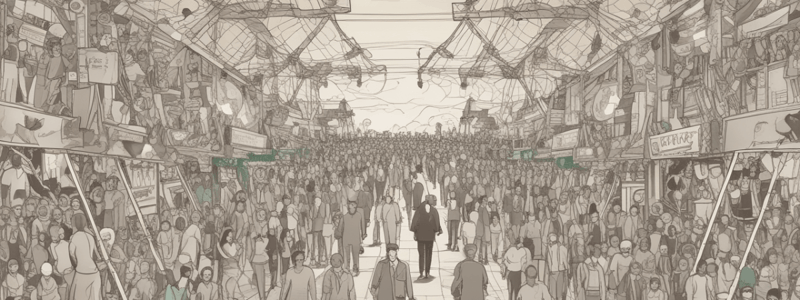Podcast
Questions and Answers
What distinguishes a social group from an aggregate?
What distinguishes a social group from an aggregate?
- A common goal or purpose
- A sense of belonging among members (correct)
- Similar characteristics among members
- A shared physical space
What is a primary group characterized by?
What is a primary group characterized by?
- Intimate, direct, and face-to-face interactions (correct)
- A focus on achieving a specific goal
- Large, anonymous, and impersonal interactions
- Short-term relationships
What is the main difference between a social group and a category?
What is the main difference between a social group and a category?
- The level of interaction among members (correct)
- The duration of the group
- The size of the group
- The shared characteristics among members
In what way do primary groups influence an individual?
In what way do primary groups influence an individual?
What is a characteristic of secondary groups?
What is a characteristic of secondary groups?
What does the distance between nodes in a social network graphic typically represent?
What does the distance between nodes in a social network graphic typically represent?
What is the term used to describe the tendency of people to form relationships with others who have similar characteristics?
What is the term used to describe the tendency of people to form relationships with others who have similar characteristics?
What can be inferred about the social tie between two individuals if the line between their nodes is thicker?
What can be inferred about the social tie between two individuals if the line between their nodes is thicker?
According to social network studies, what is the likely impact of having friends who make unhealthy food choices on your own food choices?
According to social network studies, what is the likely impact of having friends who make unhealthy food choices on your own food choices?
Which of the following is an example of homophily in social networks?
Which of the following is an example of homophily in social networks?
What is a common characteristic of groups based on shared interests, hobbies, or activities?
What is a common characteristic of groups based on shared interests, hobbies, or activities?
What can happen when you interact more with people in a larger secondary group?
What can happen when you interact more with people in a larger secondary group?
What is in-group favoritism?
What is in-group favoritism?
What do social networks refer to in the offline world?
What do social networks refer to in the offline world?
What does a node represent in a social network diagram?
What does a node represent in a social network diagram?
Flashcards are hidden until you start studying
Study Notes
Social Groups
- Social groups are groups of people with common interests, characteristics, or identities that create a sense of belonging.
- Examples of social groups include religious groups, ethnic groups, workplace colleagues, college classes, and sports teams.
Primary and Secondary Groups
- Primary groups are small, intimate, and long-lasting, providing a sense of identity and self through face-to-face interactions.
- Examples of primary groups include family and close friends.
- Secondary groups are larger, more anonymous, and impersonal, often based on shared interests or activities.
- Examples of secondary groups include temporary task groups, reading groups, and professional associations.
In-Group vs Out-Group
- An in-group is a social group with which you identify and feel a sense of belonging.
- An out-group is a social group with which you do not identify or feel a sense of belonging.
- In-group favoritism occurs when you give preferential treatment to members of your in-group.
- Studies have shown that in-group favoritism can occur even in arbitrarily assigned groups.
Social Networks
- Social networks refer to the social ties that link people together, including family, friends, acquaintances, classmates, colleagues, and neighbors.
- Social networks can be visualized as diagrams with nodes representing individuals and lines representing social ties.
- The strength and distance of social ties can be represented by the thickness and length of the lines between nodes.
Homophily
- Homophily is the tendency for people to form relationships with others who have similar characteristics.
- Homophily is present in many social network study findings, where individuals with similar traits are more likely to form social ties with one another.
- Similarities in characteristics can impact actions and behaviors, such as food choices and consumption patterns.
Studying That Suits You
Use AI to generate personalized quizzes and flashcards to suit your learning preferences.



